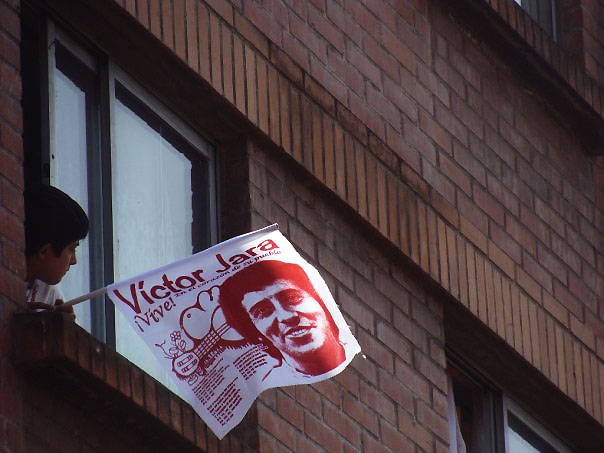
Photo by Gerardo Espíndola
On the night of September 15, 1973, Victor Jara was picked out of a line of prisoners being led out from the Chile Stadium to the National Stadium, another detention centre, in the days following Pinochet's coup. It was the last time he was seen alive by anyone except the military. On the morning of September 16, his bullet-ridden body appeared alongside those of six other victims just outside Santiago's Cementerio General.
It took three decades for the Chilean justice system to identify the eight soldiers involved, and it is now requesting the extradition of one of them from the government of the United States.
It was weapons in the hands of members of Chile's military that discharged the 44 bullets that killed Victor Jara. But the folk-singer became a legend in his homeland; and today, 40 years after the massacre, he is a major icon for musicians and their fans around the world.
Just last week, in his first concert in Chile, rocker Bruce Springsteen interrupted his usual repertoire to sing “Manifiesto”, one of Jara's most emblematic songs. It was a tribute from one creative force to another, sealing once and for all the universal importance of the Chilean artist's work. “If you are an activist and a musician, Victor Jara continues to be a great inspiration”, said Springsteen.
“Yo no canto por cantar, ni por tener buena voz. Canto porque la guitarra tiene sentido y razón. Tiene corazón de tierra y alas de palomita. Es como el agua bendita, santigua glorias y penas” (Manifiesto).
“I do not sing for the sake of singing, nor to show off my voice. I sing because the guitar has a meaning and purpose of its own. Its heart is of the earth and travels on the wings of a dove. It is like holy water, blessing glories and healing pain.” (Manifiesto)
The intimate side of Chile that Jara talked about crossed borders more quickly after his murder. On September 22, 1973, Soviet astronomer Nikolai Stepanovich Chernykh identified asteroid 2644, which orbits the sun in our system, and christened it Victor Jara, moved by the recent and brutal crime.
His name is already a star in the sky. A rebel rock star, but a rebel with a cause, according to Rolling Stone magazine which, in June 2013, published its “15 rock & roll rebels” edition, placing him in the company of Nirvana, Jerry Lee Lewis and the Sex Pistols, among others:
The love and justice songs of Chilean folk singer Victor Jara were apparently so threatening to the military leaders who staged the nation's 1973 coup that they had to murder him.

Mural of Victor Jara in Santiago, Chile. Photo by Gerardo Espíndola.
“¿But where is the rock and roll in Victor Jara?” some people ask. It's in everything he did. Just one example is his recording of “El Derecho de Vivir en Paz” [the right to live in peace] [es], which included an electric guitar and featured the rock band Los Blops [es]. For many, this instrument was a symbol of American imperialism, but for Jara it was another indication of his creativity.
In his role as theatre director, Victor Jara adapted and directed Viet Rock, a musical written by Megan Terry, refocussing the piece with a more pro-Vietnamese stance. His wife, Joan Jara, choreographed the work. In an interview published by the blog Palabra Callejera [es], she indicated that:
El rock estaba como en el movimiento de la producción de algunas cosas, tremendamente movido… Víctor era un gran coreógrafo, y se movía en la acción en toda la sala, y eso digamos es el espíritu rock, yo creo que es el espíritu rock que se produjo ahí.
Rock was like the impetus moving things along…Victor was a great choreographer and he moved the action on stage and throughout the room, and that is the essence of rock; the essence I believe of the spirit of rock and roll that was created there.
Universal Jara
“Paint your village and you paint the whole world,” said Tolstoy. Victor Jara's legacy makes that clear: folklore and rock as universal creative forces.
The British poet Adrian Mitchell wrote about Victor after his death and offered his poem to Joan Jara when she visited the UK; his verses were later read by her during a benefit concert for the victims of the Chilean dictatorship organized in the U.S. by the American protest singer Phil Ochs [es]. Ochs had met Victor during a trip to Chile years before when they had both taken part in a concert for copper miners.
The poem became a North American folksong set to music by Arlo Guthrie, who had also participated in the U.S. concert and heard the reading.
Since 1973, more than 10 films and documentaries have been made about Victor Jara in countries as far afield as France, Germany, and Spain as well as in the United States and Chile. Musicians such as Bob Dylan, Joan Baez, Astor Piazzola, and Los Fabulosos Cadillac are among those who have shown their admiration.

Funeral of Victor Jara, December 2009, photo by
Gerardo Espíndola
The legacy of Victor Jara has transcended borders, just as the echo of universal justice extends to the United States from whom the extradition of the former Chilean military officer Pedro Pablo Barrientos is being requested. The matter must be judged in Chile, and the accused must answer the charges levelled against him for the crime committed against the folksinger.
Victor Jara's hands did not bleed as those of a rock musician should, from the passionate strumming of his guitar. Jara's were destroyed with the butt of a soldier's rifle. They forced him to sing, bleeding, and he sang. And 40 years later his voice is still heard, and his music rocks on.







3 comments